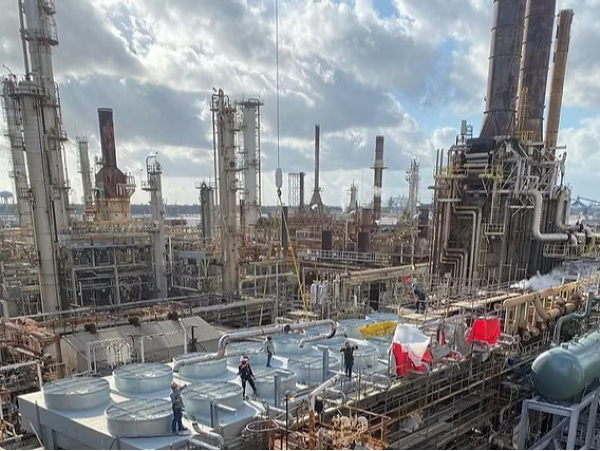Introduction
PBF Energy, one of the largest independent petroleum refiners in the United States, stands out in the refining and logistics industry. In this analysis, we’ll cover PBF Energy's company profile, fundamental and technical analysis, oil price trends as a potential price catalyst, and conclude with key takeaways.
Company Overview
PBF Energy, founded in 2008, emerged as a joint venture involving Petrol Plus Holdings, Blackstone Group, and First Reserve. The name "PBF" itself reflects its founders: Petrol Plus, Blackstone, and First Reserve. With an initial equity commitment of $667 million, PBF Energy has grown to become a significant supplier of unbranded transportation fuel, heating oil, lubricants, and other petroleum products.
The company's geographical reach spans across major U.S. regions—Midwest, Gulf Coast, and West Coast—and internationally to Canada, Mexico, and other global markets. PBF Energy operates through two primary segments:
- Refining - Converting crude oil into products such as gasoline, diesel fuel, and lubricants.
- Logistics - Transporting and delivering refined products to suppliers and customers through pipelines, rail, and other channels.
Understanding Oil Refining
Oil refining is an industrial process where crude oil is transformed into usable products like gasoline, kerosene, and diesel fuel. By heating crude oil at varying temperatures, it’s separated into different products based on their boiling points. PBF Energy’s operations align with this process, producing an array of products including liquefied gases, asphalt, and jet fuels.
The company owns refineries solely within the United States, boasting a combined production capacity of around 1 million barrels per day.
Company Fundamentals
PBF Energy is characterized by robust fundamentals typical of the oil and gas sector:
- Market Capitalization: $3 billion.
- Price-to-Earnings Ratio (P/E): 5, indicating strong valuation.
- Price-to-Book Ratio: Below 0.5, suggesting a discount to book value.
- Debt-to-Equity Ratio: 34%, showing reasonable leverage.
- Cash and Debt: With close to $1 billion in cash and $2 billion in debt, the company demonstrates a manageable financial position.
The company has also been active in reducing debt, cutting it from $5 billion to $2 billion in recent years, which significantly improves its financial health.
Additionally, insider buying has been notable, with a $300 million investment by one firm. This reflects strong confidence in the company’s potential.
Technical Analysis & Stock Trends
From a technical perspective, PBF Energy’s stock had a significant bottom in 2020, aligning with the lowest crude oil prices during the global crisis. Subsequently, 2022 and 2023 were strong years, with the stock breaking previous resistance levels. However, recent trends indicate a downward trajectory, with potential for further declines.
The stock's performance is closely tied to crude oil prices, which have shown a downward trend in recent months. Unless oil prices stabilize or recover, PBF Energy’s stock could remain under pressure.
Key Takeaways
Advantages:
- Attractive valuation with low P/E and price-to-book ratios.
- Consistent debt reduction, improving financial flexibility.
- Significant insider buying, reflecting confidence in the company's future.
Risks:
- Dependence on crude oil prices, which are currently under pressure.
- Negative free cash flow in certain periods, reflecting volatility in operating performance.
- Recent increase in share count, which could dilute shareholder value.
Conclusion
PBF Energy presents a compelling investment case due to its strong fundamentals and undervaluation. However, risks associated with crude oil prices and stock dilution should be carefully monitored. With insider confidence and a well-diversified business model, PBF Energy remains a stock worth considering for long-term investors in the petroleum refining and logistics sector.
https://youtu.be/m5A7aZp40Pc?si=T1yrJDz6KYLVadLB























Introduction
PBF Energy, one of the largest independent petroleum refiners in the United States, stands out in the refining and logistics industry. In this analysis, we’ll cover PBF Energy's company profile, fundamental and technical analysis, oil price trends as a potential price catalyst, and conclude with key takeaways.
Company Overview
PBF Energy, founded in 2008, emerged as a joint venture involving Petrol Plus Holdings, Blackstone Group, and First Reserve. The name "PBF" itself reflects its founders: Petrol Plus, Blackstone, and First Reserve. With an initial equity commitment of $667 million, PBF Energy has grown to become a significant supplier of unbranded transportation fuel, heating oil, lubricants, and other petroleum products.
The company's geographical reach spans across major U.S. regions—Midwest, Gulf Coast, and West Coast—and internationally to Canada, Mexico, and other global markets. PBF Energy operates through two primary segments:
Understanding Oil Refining
Oil refining is an industrial process where crude oil is transformed into usable products like gasoline, kerosene, and diesel fuel. By heating crude oil at varying temperatures, it’s separated into different products based on their boiling points. PBF Energy’s operations align with this process, producing an array of products including liquefied gases, asphalt, and jet fuels.
The company owns refineries solely within the United States, boasting a combined production capacity of around 1 million barrels per day.
Company Fundamentals
PBF Energy is characterized by robust fundamentals typical of the oil and gas sector:
The company has also been active in reducing debt, cutting it from $5 billion to $2 billion in recent years, which significantly improves its financial health.
Additionally, insider buying has been notable, with a $300 million investment by one firm. This reflects strong confidence in the company’s potential.
Technical Analysis & Stock Trends
From a technical perspective, PBF Energy’s stock had a significant bottom in 2020, aligning with the lowest crude oil prices during the global crisis. Subsequently, 2022 and 2023 were strong years, with the stock breaking previous resistance levels. However, recent trends indicate a downward trajectory, with potential for further declines.
The stock's performance is closely tied to crude oil prices, which have shown a downward trend in recent months. Unless oil prices stabilize or recover, PBF Energy’s stock could remain under pressure.
Key Takeaways
Advantages:
Risks:
Conclusion
PBF Energy presents a compelling investment case due to its strong fundamentals and undervaluation. However, risks associated with crude oil prices and stock dilution should be carefully monitored. With insider confidence and a well-diversified business model, PBF Energy remains a stock worth considering for long-term investors in the petroleum refining and logistics sector.
https://youtu.be/m5A7aZp40Pc?si=T1yrJDz6KYLVadLB